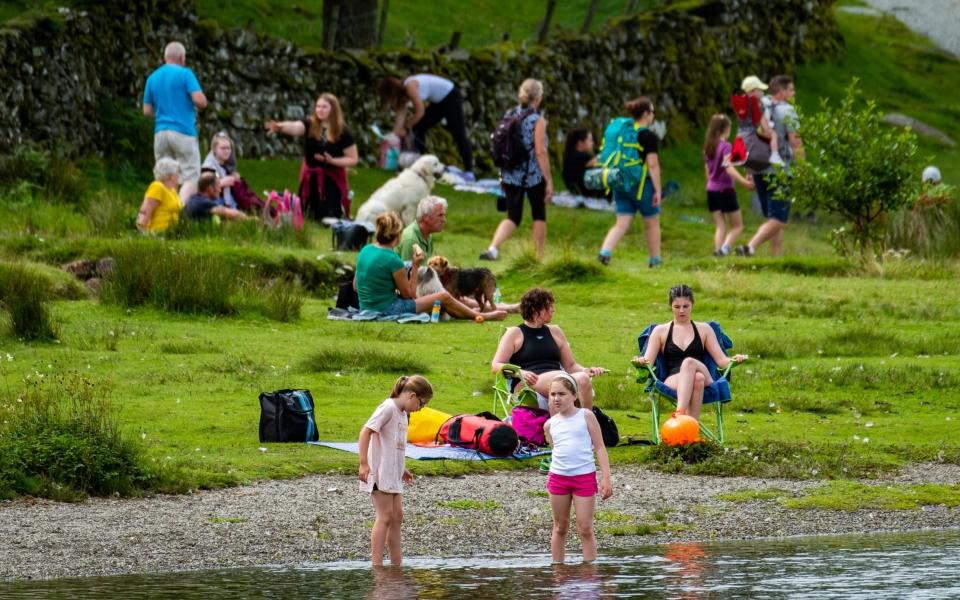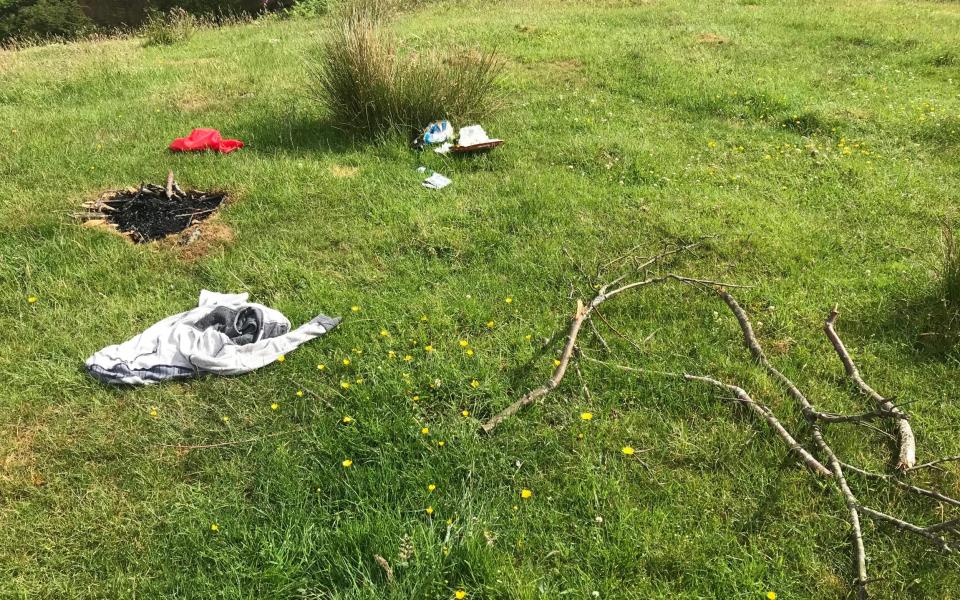'The new Magaluf': How the Lake District became the go-to destination for party-loving staycationers

Every evening for the past month or so, Jon Watson has walked through the 700 acres he farms between Coniston and Ambleside to inspect the damage visitors have left in their wake.
As well as the gates that have been left open, disrupting his sheep and cattle, and fire pits scorched into the grass, he has also retrieved a staggering amount of rubbish – enough to fill 12 wheelie bins.
Thursday night's haul included an abandoned tent, disposable barbecues, beer bottles, food wrappers and various sodden items of clothing.

"It makes me very angry and totally bewildered as to why anybody would leave all that behind," says the 56-year-old.
Watson has farmed this land for 18 years and runs a self-catering accommodation with his wife. Others in the area have likened the rowdy crowds to something out of Magaluf.

They find themselves in the same quandary encountered by many residents and businesses in national parks up and down the land.
While dependent on visitor income for their livelihood – Cumbria's tourist economy is worth nearly £3 billion to the county each year – currently, the sheer number of tourists and the lack of respect they are showing for the countryside is driving them to the brink.
"It's twice as bad at least, if not more, than previous years," says Watson of the antisocial behaviour he is encountering on the fells.
"There is a certain element who normally would have gone to Spain or somewhere like that, or a festival, where they are used to leaving rubbish behind, but now they are coming here because there is nowhere else to go."

While Brits behaving badly abroad is nothing new, in the summer of Covid-19 it seems our chickens have come home to roost.
National parks across the country have reported similar scenes of antisocial behaviour. In Dartmoor this week, authorities were forced to impose an emergency wild camping ban after the ancient landscape at Bellever, near Riddon Ridge, was turned into a mini festival site with up to 70 tents spanning an area of around 500 metres by 50 metres.
Ally Kohler, the director for conservation and communities at Dartmoor National Park Authority, visited the site a week or so ago and was reduced to tears by what she encountered – rubbish strewn across the moor, 50 or so fire pits potentially made out of stones taken from archaeological sites nearby, and every gorse bush used as a makeshift toilet.
"I used to take my family to this site to picnic, and there is no way I would take them now," she says. "If you played hide and seek in the bushes, you can be absolutely assured you would come across soiled toilet tissue - if not worse."
While wanting to encourage young people into the national park, she says the landscape is being abused. "It’s about behaving properly and responsibly. Rather than that connection back to nature, what we are seeing here is more like a festival, to be honest."

Around 18 million British people alone visit Spain each year and, with a quarantine on arrivals already in place and cases rising across other favourite European travel destinations, tourists are looking close to home.
On any normal year a similar number of tourists would come to the Lake District, but during the summer of staycation, normally busy villages are now becoming overwhelmed.
Back in the Lake District, around Coniston Water, the national park authorities have put emergency road closures into place to try and stem the crowds.
Jean Johnson, who runs the Orchard Cottage bed and breakfast close to the lake, says that, during recent hot spells, people have been dumping tents and barbecues on the shoreline, forcing locals to go out and collect the rubbish. Others have reported people carting crates of beer over to the lake and then leaving the bottles.
"A lot of people here visiting are not who we would call normal summer visitors," she says. "They are people who would normally fly out to Benidorm and all those sort of places, and because they're not flying abroad they're coming to the Lakes."
Douglas Chalmers, the chief executive of Friends of the Lake District, says there have also been reports of people toppling drystone walls to gain access to fields and lopping down trees to burn.
"We seem to have got into generations of visitors now with no awareness of the countryside code," he says. "There is a lack of appreciation that they are in someone's community, and even if they are in open countryside that belongs to somebody, they should respect everything that is there."
Mountain rescue teams in the area are also reporting "unprecedented" numbers of call-outs as visitors get into trouble on unfamiliar terrain.
On Tuesday night, rescuers from four mountain rescue teams spent hours searching for a family of six who hired bikes in Windermere and attempted to cycle to the Wasdale Head Inn on the other side of the national park but never arrived.

Chris Higgins, the leader of the Keswick mountain rescue team, says the family had been warned by the bike hire shop that the weather was looking bad but they ignored the advice and set off in thin lycra and windproofs with no indication of which route they were planning.
They eventually emerged the following morning, having spent a night on the fells and being forced to abandon their bikes.
"To be quite blunt they were lucky to have come off as lightly as they did and nobody to be seriously ill or dead," Higgins says.
In the past nine days, the mountain rescue team has received 12 call-outs – a 50 per cent increase on previous years. "We totally understand how people want to get out into countryside, but a lot don't appreciate the seriousness of their undertaking," he says.
The fear among people in the Lakes is that this year's staycation antics will put off the sort of tourists upon whom the livelihood of its communities depend.
If people come expecting Wordsworth and encounter a scene befitting Wandsworth, the worry is that they may never return.

 Yahoo News
Yahoo News 